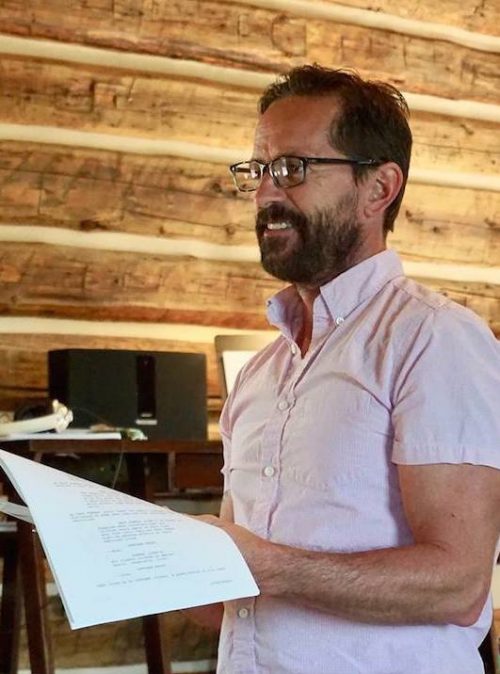
BY JUDY CARMACK BROSS
Billy Lombardo is a bard for those of us who feel too much and a master of somehow translating the untranslatable emotion into gesture, into language. —Gina Frangello, Editor
Catching up with author Billy Lombardo the week his first novel, Morning Will Come, comes out, with a launch looming large on his calendar for January 25 at Volumes Bookcafe on Milwaukee Avenue, was filled with the buzz of excitement that only a big “first” such as this can bring. Set in the Near North Side of Chicago, with the lost landmark like the Wells Street Treasure Island as one backdrop, this tale of violence and loss compels you to read rapidly—I stayed up much to late finishing my printer’s copy.

It is no wonder Lombardo was named a Nelson Algren Fiction Award winner for his short stories or that he was rightly a superstar at the Green Mill poetry slams: his ability to speak in a timeless way about the preciousness and precariousness of life stops you in your tracks.
In person, as in his writing, he has a cool patience developed over years of playing and coaching tennis, and literary skills honed over 3 decades of teaching English. He currently heads Writing Pros/e, a writing and editing business that includes coaching students on college essays. He is currently at work on a book on the craft of fiction, House of Fiction, Deconstructed for the Apprentice Writer.
“When I write fiction, I use the imagined narrative. I begin by imagining what my characters lives are like, what their houses look like, what they do when they are home, and all the other details. It creates a whole narrative of their lives,” he shares.
His characters in Morning Will Come—Alan and Audrey, a married couple, and their two sons—are grieving the loss of the eldest child, a daughter named Isabel, and coping, just barely. The marriage is unraveling, Alan is changing careers, and their two boys continue to witness in their minds what happened to their sister.

His editor, Gina Frangello, calls Lombardo’s work “hot, poetic and urgent.” She explains, “Billy Lombardo, who had not been weaned on workshops, had never gotten the memo that makes so many literary writers fear the purple prose of feeling above all else. He wrote by instinct alone, and the result was a text that was an electrical storm of emotion—the kind of emotion felt by people who are not concerned with being ‘cool,’ and the ways coolness limits the human range of feeling.”
“In the frenzied two weeks or so of completely re-conceptualizing what had been four distinct stories to link them and expand upon them, thus creating the story of one family in the worst of turmoil and loss, Billy had covered what felt like a lifetime of emotional range,” she adds.
Lombardo tells us that his novel is heavily fictionalized but says, “People have told me stories and it is based on real characters.” Many of the settings have also been a part of his life.
Lombardo grew up in a house in Bridgeport where there were few books: “I went on a real reading tear when I grew up, and I view reading as a craft.” He went on to get an MFA in fiction writing.

When he isn’t reading and writing, he continues his commitment to helping high school students learn the skill of communicating through the written word. “I taught at a private school for 25 years where kids were so good at analyzing literature and could recognize losses, grief, and sorrow in books. What they needed to learn was how to see the great value of these issues in their own lives and be able to write about them,” he explains. “Kids are hoping to have lives of meaning—their teachers are hoping for that as well—and the kids need to learn to tell their own stories. This is definitely important as they write essays for college admittance.”
He continues, “With their essays, colleges know what they are doing even if they appear to be having fun with their questions. They are looking for kids to be creative, to document their lives. Each college wants to provide the unique question so that students aren’t doubling up, sending the same essay to other schools where they apply.”
Lombardo is the founder and managing editor of Polyphony Lit, a global literary platform for high school writers and editors. At the core of this is a literary magazine run by an international staff of more than 200 high school editors around the world who comment on every one of the thousands of submissions that come in each year—2,706 in 2019—from more than 70 countries.
With his own writing, figuring out point of view, not dealing with writer’s block, is his greatest challenge: “I ask myself: Who does the story belong to?”
Lombardo is also a fan of “flash fiction” which he terms one- paragraph stories, saying that it gives him reachable daily goal. Most frequently, his format is a novel in stories, in which each chapter can stand alone but also be read as a larger story.
Green Mill regulars recall his Sunday night poetry slam readings, something he did frequently before turning to fiction writing. “I fell in love with the place and found that when I had a particularly good piece with some real truth in it, I wanted the experience to go on every moment of my life,” he recalls.

In addition to a full schedule of reading events for Morning Will Come, Lombardo is taking real delight in building his writing business: “As an editor I am not only teaching the nuts and bolts but helping people find their own language. Helping people learn to speak their emotions through writing brings great joy.”
Meet Billy Lombardo at his book launch on Saturday, January 25 at 7:00 pm at Volumes Bookcafe, 1474 North Milwaukee Avenue. To learn more, visit billylombardoauthor.com.







